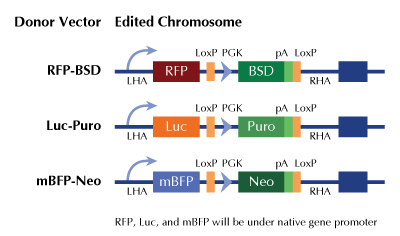CD35 (CR1) Human Gene Knockout Kit (CRISPR)
CAT#: KN216533LP
CR1 - human gene knockout kit via CRISPR, HDR mediated
HDR-mediated knockout kit validation
CNY 12,260.00
CNY 3,710.00
CNY 1,999.00
CNY 2,700.00
CNY 21,536.00
Specifications
| Product Data | |
| Format | 2 gRNA vectors, 1 Luciferase-Puro donor, 1 scramble control |
| Donor DNA | Luciferase-Puro |
| Symbol | CD35 |
| Locus ID | 1378 |
| Kit Components |
KN216533G1, CD35 gRNA vector 1 in pCas-Guide CRISPR vector KN216533G2, CD35 gRNA vector 2 in pCas-Guide CRISPR vector KN216533LP-D, donor DNA containing left and right homologous arms and Luciferase-Puro functional cassette. GE100003, scramble sequence in pCas-Guide vector |
| Disclaimer | These products are manufactured and supplied by OriGene under license from ERS. The kit is designed based on the best knowledge of CRISPR technology. The system has been functionally validated for knocking-in the cassette downstream the native promoter. The efficiency of the knock-out varies due to the nature of the biology and the complexity of the experimental process. |
| Reference Data | |
| RefSeq | NM_000573, NM_000651 |
| Synonyms | C3BR; C4BR; CD35; KN |
| Summary | This gene is a member of the receptors of complement activation (RCA) family and is located in the 'cluster RCA' region of chromosome 1. The genome is polymorphic at this locus with allele-specific splice variants encoding different isoforms, based on the presence/absence of long homologous repeats (LHRs). The gene encodes a monomeric single-pass type I membrane glycoprotein found on erythrocytes, leukocytes, glomerular podocytes, and splenic follicular dendritic cells. The Knops blood group system is a system of antigens located on this protein. The protein mediates cellular binding to particles and immune complexes that have activated complement. Decreases in expression of this protein and/or mutations in this gene have been associated with gallbladder carcinomas, mesangiocapillary glomerulonephritis, systemic lupus erythematosus, sarcoidosis and Alzheimer's disease. Mutations in this gene have also been associated with a reduction in Plasmodium falciparum rosetting, conferring protection against severe malaria. [provided by RefSeq, May 2020] |
Documents
| Product Manuals |
| FAQs |
Resources
| 基因表达相关资源 |
Other Versions
| SKU | Description | Size | Price |
|---|---|---|---|
| KN216533 | CR1 - human gene knockout kit via CRISPR, HDR mediated |
CNY 12,260.00 |
|
| KN216533BN | CR1 - human gene knockout kit via CRISPR, HDR mediated |
CNY 12,260.00 |
|
| KN216533RB | CR1 - human gene knockout kit via CRISPR, HDR mediated |
CNY 12,260.00 |
|
| KN416533 | CR1 - KN2.0, Human gene knockout kit via CRISPR, non-homology mediated. |
CNY 8,680.00 |
|
| GA100965 | CR1 CRISPRa kit - CRISPR gene activation of human complement C3b/C4b receptor 1 (Knops blood group) |
CNY 12,255.00 |


 United States
United States
 Germany
Germany
 Japan
Japan
 United Kingdom
United Kingdom
 China
China

